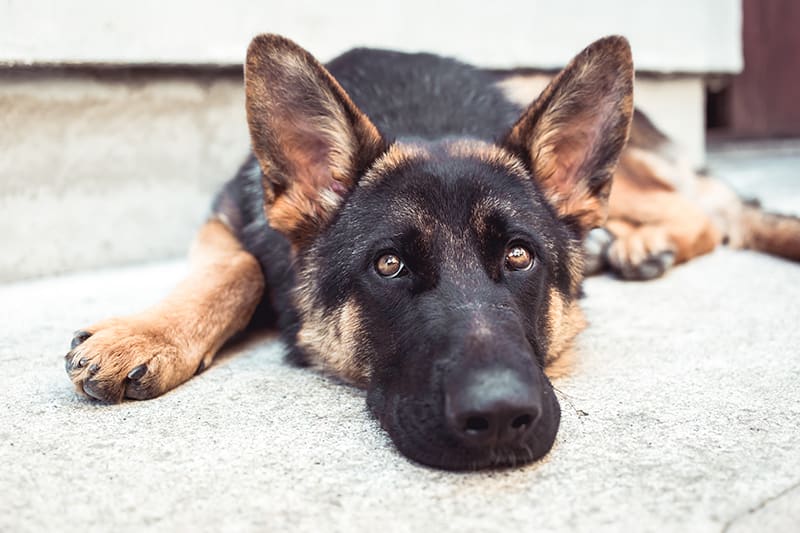Constipation & Your Dog's Health
If your dog's bowel movements are infrequent, difficult for them to pass or absent, your pet is likely suffering from constipation.
The inability to pass feces or pain associated with passing feces is considered a veterinary medical emergency and requires immediate care!
Signs of Constipation in Dogs
If your pup is straining when attempting to pass a stool and/or is producing hard, dry stools, these are also considered signs that your dog should be examined by a vet as soon as possible.
In some cases, dogs may pass mucus when trying to defecate, circle excessively, scoot along the ground, or squat frequently without defecating. If you press on their stomach or lower back, they may have a tense, painful abdomen that causes them to growl or cry.
Causes of Constipation in Dogs
There are a number of circumstances that can lead to your dog becoming constipated. Some of the most common are:
- Ingested pieces of toys, gravel, plants, dirt and bones caught in the intestinal tract
- Lack of exercise
- Excessive or insufficient fiber in his diet
- Other illnesses leading to dehydration
- Blocked or abscessed anal sacs
- Excessive self-grooming (excessive amounts of hair to collect in the stool)
- A side effect of medication
- An orthopedic issue causing pain when a dog positions himself to defecate
- Enlarged prostate gland
- Sudden change in diet or sampling new foods
- Matted hair surrounding the anus (caused by obesity or lack of grooming)
- Neurological disorder
- Obstruction caused by tumors or masses on the anus, or within the rectum
- Trauma to pelvis
Senior pets may experience constipation more often. However, any dog that faces one or more of the scenarios above can suffer from constipation.
Common Dog Constipation Symptoms & Signs
Signs of constipation include straining, crying or crouching when attempting to defecate. Also, if it’s been more than two days since he has had a bowel movement, you should see your vet immediately.
Keep in mind that these symptoms may be similar to those that could point to a urinary tract issue, so it’s important that your vet perform a full physical exam to diagnose the cause.
How To Treat Constipation in Dogs
We are often asked, "what can I give my dog for constipation"?
To begin, never give your dog medications or treatments formulated for humans without consulting your vet first. Many human medications are toxic to dogs.
The absolute best thing to do if your dog is constipated is to contact your vet right away and bring your dog in for an exam. The treatment for your dog's constipation will depend upon the underlying cause of your pup's condition.
If your pup has eaten something they shouldn't have there is a chance that there is a blockage causing the issue. This is a medical emergency that will likely require urgent surgery.
Blood tests may help reveal that your pup has an infection or is suffering from dehydration. The vet will likely take a medical history, conduct a rectal examination to rule out other causes or abnormalities, and may recommend one or a combination of these treatments:
- Prescription diet high with fiber
- Stool softener or another laxative
- More exercise
- Enema (administered by a professional, not at home, as there could be risk of injury or toxicity if done incorrectly)
- Adding more fiber to your dog’s diet (wheat bran, canned pumpkin or products such as Metamucil)
- Small bowl of goat or cow milk
- Medication to increase large intestine’s contractile strength
Follow your vet’s instructions closely, as trying too many of these or the wrong combination may bring on the opposite problem - diarrhea. You don’t want to trade one digestive problem for another.
If Dog Constipation Goes Untreated
Constipation is a very serious symptom depending on the cause. If your pup has eaten something they shouldn't have they could be experiencing a life-threatening obstruction. Veterinary care is essential or the situation could become fatal.
Untreated, dog constipation could also reach the point where your pooch becomes unable to empty their colon on their own (a condition called obstipation). The colon then becomes packed with an uncomfortably large amount of feces, causing lethargy, unproductive straining, loss of appetite and potentially vomiting.
Note: The advice provided in this post is intended for informational purposes and does not constitute medical advice regarding pets. For an accurate diagnosis of your pet's condition, please make an appointment with your vet.
If your canine companion is showing signs of constipation contact our Greensboro vets right away to book an examination for your pup.
Looking for a vet in Greensboro?
We're always accepting new patients, so contact our veterinary hospital today to book your pet's first appointment.
Related Articles View All
What happens during a routine pet exam?
Routine wellness exams are a proactive way to help safeguard your pet's long-term health and vitality. Why should you take your healthy pet to the vet? What happens during a pet health wellness exam? Find out.
How much does an emergency vet visit cost?
Emergency veterinary care can be costly, but planning ahead allows you to make decisions about your pet's care based on their needs rather than financial restrictions. Today, we look at the cost of emergency vet care, and how to be ready if your pet needs emergency treatment.
Kidney Failure in Dogs
Chronic and acute kidney failure are serious health problems commonly seen in dogs. Here, you will learn about the differences between chronic and acute kidney failure in dogs, the signs to watch for and how these conditions are treated.
Signs of Bladder Infections in Dogs & How They Are Treated
Many dogs suffer from bladder infections and other issues affecting the urinary tract system. What causes bladder infection in dogs? What signs should you watch for? How do vets treat bladder infections in dogs? Read on to find out.


